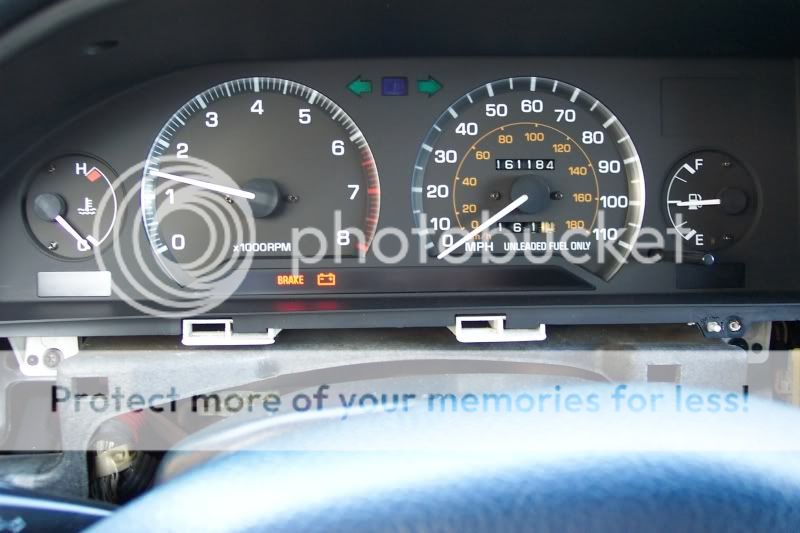This is a long post.
THE PROBLEM: My (third) alternator and (possibly) the battery, are giving me problems. For the past several years my car has been getting the perplexing "battery discharge/brake warning" lights on my dashboard periodically during the drive. It was happening apparently randomly, sometimes at idle, sometimes driving city streets, other times on the highway. In each case, the battery discharge light and brake warning" light would come on for a few minutes and then go off. I read elsewhere that this is an indicator that the alternator or its voltage regulator were failing and need replacing. Whenever I would test the car, the problem would not occur and I got the nominal voltages of ~ 14.2 volts for the charging alternator and 12.5 volts for the battery.
A short time ago, I noticed the problem had changed a bit. When these warning lights would come on, they would coincide more with the idle speed dropping a bit. They were also starting to be more frequent and staying on longer (several minutes). If I a driving at night when this happens, the dash board illumination dims. Two weeks ago, I had trouble starting the car. And two days ago, at night, I left the lights on only for a few (~ 10 minutes) and then it would not turn over the engine when I tried to get it started. I had to get a jump start. So even though all the lights and instruments worked fine (at night) with little dimming when the engine was off, the engine would not turn over without a jump. The engine turned over on the first try with the jump.
Yesterday, I finally got the battery discharge light/brake warning light to go on while the car was curbside. I then metered out the voltage with a digital voltmeter and when the red dashboard warning lights came on the battery voltage dropped to 12.25 volts; when the battery discharge/brake warning lights went off, the battery voltage jumped to the charging voltage of 14.2 volts.
POSSIBLE DIAGNOSIS: So, I am assuming that either the voltage regulator is failing, or something else is wrong with the alternator. In either case, the battery is not being charged, and causing the battery discharge/brake warning lights to go on.
OPTIONS at this point are to:
1. Replace the voltage regulator only.
2. Replace the alternator, which comes with a voltage regulator.
and (maybe)
3. Replace the battery.
My car is on its third alternator, a 60 amp Bosch rebuild put in 7 years ago, but the previous (second) alternator lasted only 6 months. I know that over time, alternators can get glazing and other defects due to the heat and engine dirt and oil onto their windings, leading to premature failure.
I am assuming that replacing the alternator would be the best option given that if I choose the right vendor, I can get one that is a quality rebuild. So far, Denso and Toyota are two brands that I have in mind; maybe Bosch. I was told to avoid local parts store remanufactured ones as they fail too soon. Also, I read that a long warranty (year or more or lifetime).
Does anyone have suggestions about which alternators to get, where to get quality alternators and their warranties. My Corolla is an '88, which I know is old, but I like it enough that I'd like to keep it a while longer. It is also the best snow car that I've ever owned.
The battery (Diehard Gold model) was also replaced when the second alternator was put in, so it is even older. I know that over time, lead acid batteries can develop internal problems with their plates and chemicals, due to both charging issues and mechanical stress from driving that cause them to eventually fail.
Can anyone also suggest a brand of battery which to get? Reliability and starting power are the most important factors for me, especially in cold/snow and hot weather. Some brands which I have been looking at are: Interstate, store brands ProStart, Diehard (again), etc.
ALTERNATOR UPGRADE? My car does not have any fancy electronics built in, save for an electric sunroof; everything else is manual. However, I do run chargers for a cell phone, GPS, and a laptop converter off the cigarette lighter. So, I was thinking that if I must replace the alternator, perhaps I could go with a higher amperage model, say 70 amps? I realize that 70 amps is max output and actual out is probably under 25 amps at idle. Some vendors sell doubled amp models, which offer twice the amperage output, and some local shops will upgrade/rebuild them that way. So if you brought to a local shop a 60 amp model, they return to you a 120 amp model that puts out 75 amps at idle. Of course, they are more expensive ~ $150-200 and come with only a year warranty.
Is it worth getting a higher amperage alternator or am I wasting my money?
How can I test the amperage requirements of my car (by metering out the amps under full load across the battery terminals?)
BATTERY UPGRADE? Should I look into an AGM battery such as the Optima Yellow Tops instead of a regular lead acid battery? Are the AGMs worth the expense? Are there problems with them in terms of long-term storage? Currently my car is a daily driver, but there is the possibility next year that I may be going overseas for a year and would put the car in storage during the time I am away,
Thanks for putting up with a long post.

